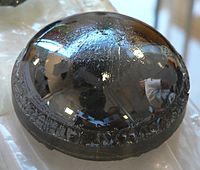
Simple Construction of Multistage Stable Silicon-Graphite Hybrid Granules for Lithium-Ion Batteries.
Sign Up to like & getrecommendations! Published in 2023 at "Small"
DOI: 10.1002/smll.202207167
Abstract: Because of its high specific capacity, the silicon-graphite composite (SGC) is regarded as a promising anode for new-generation lithium-ion batteries. However, the frequently employed two-section preparation process, including the modification of silicon seed and followed mixture… read more here.
Keywords: stable silicon; ion batteries; multistage stable; lithium ion ... See more keywords

A low-cost silicon-graphite anode made from recycled graphite of spent lithium-ion batteries
Sign Up to like & getrecommendations! Published in 2021 at "Journal of Electroanalytical Chemistry"
DOI: 10.1016/j.jelechem.2021.115073
Abstract: Abstract Recycling graphite from spent lithium-ion batteries has substantial significance in protection of environment as well as in growth of economic. Silicon-graphite composite materials have been extensively studied and expected to replace graphite in commercial… read more here.
Keywords: silicon; graphite; silicon graphite; lithium ion ... See more keywords

An ultraviolet curable silicon/ graphite electrode binder for long-cycling lithium ion batteries
Sign Up to like & getrecommendations! Published in 2021 at "Journal of Power Sources"
DOI: 10.1016/j.jpowsour.2020.229348
Abstract: Abstract Urushiol monomers, which are used as a new ultraviolet curable binder (Ur Binder), have been directly applied to prepare silicon/graphite electrodes of lithium batteries. Investigations show that the Ur Binder is conducive to the… read more here.
Keywords: ultraviolet curable; silicon graphite; binder; lithium ... See more keywords

Capacity Fade and Its Mitigation in Li-Ion Cells with Silicon-Graphite Electrodes
Sign Up to like & getrecommendations! Published in 2017 at "Journal of Physical Chemistry C"
DOI: 10.1021/acs.jpcc.7b06118
Abstract: Silicon-graphite (Si-Gr) electrodes typically contain lithiated carboxylates as polymer binders that are introduced through aqueous processing. Li-ion cells with such electrodes show significantly faster capacity fade than cells with graphite (Gr) electrodes. Here we examine… read more here.
Keywords: capacity; capacity fade; silicon graphite; graphite electrodes ... See more keywords

Lithium-Ion Battery Degradation: Measuring Rapid Loss of Active Silicon in Silicon–Graphite Composite Electrodes
Sign Up to like & getrecommendations! Published in 2022 at "ACS Applied Energy Materials"
DOI: 10.1021/acsaem.2c02047
Abstract: To increase the specific energy of commercial lithium-ion batteries, silicon is often blended into the graphite negative electrode. However, due to large volumetric expansion of silicon upon lithiation, these silicon–graphite (Si–Gr) composites are prone to… read more here.
Keywords: loss; loss active; lithium ion; silicon ... See more keywords

Nitrogen Plasma-Assisted Functionalization of Silicon/Graphite Anodes to Enable Fast Kinetics.
Sign Up to like & getrecommendations! Published in 2022 at "ACS applied materials & interfaces"
DOI: 10.1021/acsami.1c19879
Abstract: The practical use of silicon anodes is interfered by the following key factors: volume expansion, slow kinetics, and low electrical and ionic conductivities. Many studies have focused on surface engineering from the particle to electrode… read more here.
Keywords: graphite anodes; silicon graphite; functionalization; nitrogen plasma ... See more keywords

Toward the Integration of a Silicon/Graphite Anode-Based Lithium-Ion Battery in Photovoltaic Charging Battery Systems
Sign Up to like & getrecommendations! Published in 2022 at "ACS Omega"
DOI: 10.1021/acsomega.2c02940
Abstract: Solar photovoltaic (PV) energy generation is highly dependent on weather conditions and only applicable when the sun is shining during the daytime, leading to a mismatch between demand and supply. Merging PVs with battery storage… read more here.
Keywords: photovoltaic; graphite anode; lithium ion; battery ... See more keywords

Silicon/Graphite/Amorphous Carbon as Anode Materials for Lithium Secondary Batteries
Sign Up to like & getrecommendations! Published in 2023 at "Molecules"
DOI: 10.3390/molecules28020464
Abstract: Although silicon is being researched as one of the most promising anode materials for future generation lithium-ion batteries owing to its greater theoretical capacity (3579 mAh g−1), its practical applicability is hampered by its worse… read more here.
Keywords: carbon; anode materials; amorphous carbon; silicon graphite ... See more keywords